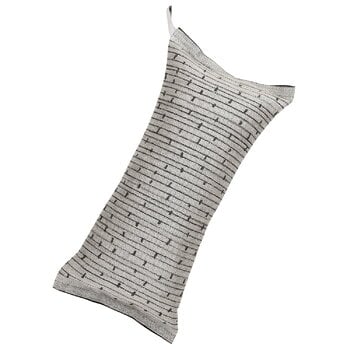The Metsä sauna pillow, designed by Tong Ren for Lapuan Kankurit, features a simple, geometric pattern inspired by the textures and shapes found in Finnish forests – "metsä" is Finnish for forest. Made of a blend of linen and cotton and filled with fire-resistant polyester fibre, the cushion has been woven in Finland at the own weaving mill of Lapuan Kankurit.
Metsä sauna pillow, linen - black
Lapuan Kankurit
Description
The Metsä sauna pillow, designed by Tong Ren for Lapuan Kankurit, features a simple, geometric pattern inspired by the textures and shapes found in Finnish forests – "metsä" is Finnish for forest. Made of a blend of linen and cotton and filled with fire-resistant polyester fibre, the cushion has been woven in Finland at the own weaving mill of Lapuan Kankurit.
Product details (7)
- Colour
- Linen, black
- Fabric
- 60% washed European "Masters of Linen" linen, 40% bio-organic cotton
- Filling
- 100% polyester fibre, fire resistant
- Length
- 20 cm
- Width
- 46 cm
- Notes
- Keep away from the hot stove. Do not sleep in the sauna. Remember to take the textiles out of the sauna always after use, do not dry textiles inside sauna.
- Care instructions
- Gentle wash in 40 °C in plenty of water
- Product ID
Designer
Tong Ren is a Chinese-born designer who has lived in Helsinki, Finland since 2010. He has a background in industrial design, and he has studied at the Fashion, Clothing and Textile Design department of Aalto University, Helsinki. Tong Ren searches for inspiration from nature and travelling, and he aims at telling stories through colours and materials.
View all productsReviews (0)
Sustainability
The Product Sustainability Framework, our criteria of sustainable design, helps you find the most sustainable products in our selection. Read below which sustainability criteria this product has met.
Working conditions & labour 9/9
-
Equal opportunities for all employees
-
Commitment to UN Global Compact, fair compensation for all employees
-
Corporate responsibility requirements defined and communicated for suppliers
-
Systematic work for improved inclusion and well-being in the workplace
-
Transparent supply chain
-
Suppliers' compliance to a code of conduct ensured
-
Direct suppliers audited and certified
-
Compliance to the UN Guiding Principles on Business and Human Rights ensured in the supply chain
-
Support for community involvement in the supply chain
Eco-friendly production 9/9
-
Fair and resource-wise water-use in production
-
No incineration or landfilling of returned items
-
No use of endangered species as materials
-
No direct environmental emissions or waste (excl. GHGs) from production
-
The sustainability of direct suppliers' production is addressed and monitored
-
Production and material sourcing that respect biodiversity, animal rights, and natural ecosystems
-
Material-efficient and ecological packaging
-
Positive impact on nature’s well-being through operations that regenerate natural ecosystems
-
No potentially harmful chemicals used in own production
Climate impact 6/8
-
Company's direct greenhouse gas emissions identified and commitment to reduction
-
Product's carbon impact identified and commitment to reduction
-
Guidance on energy- and eco-efficient use of the product
-
Contribution to climate initiatives beyond the brand’s direct operations
-
Carbon footprint of the product calculated and goals set to reduce it
-
100 % renewable energy in own production and operations
-
Low-carbon or compensated transportation
-
Carbon neutral or carbon negative product
Sustainable materials 6/6
-
Sustainable and long-lasting material choices
-
No harmful or hazardous substances
-
Responsible raw material sourcing and production
-
Materials suited for circularity: monomaterials, recyclable finishings, renewable or recycled contents etc.
-
Ecological materials: natural, biodegradable, recyclable or recycled contents
-
Outstanding materials in terms of innovativeness, responsibility, sustainability and circularity: local production or sourcing, 100 % recycled content, C2C-certification etc.
Circular design 5/5
-
High aesthetic quality promoting long-term use of the product
-
Technically durable product design and material choices
-
Design for enduring life-long quality
-
Design and support for product maintenance, repair and upgradability
-
Innovative circular design solutions: circular service system, resale platform, remanufacturing, collection of used products, etc.






